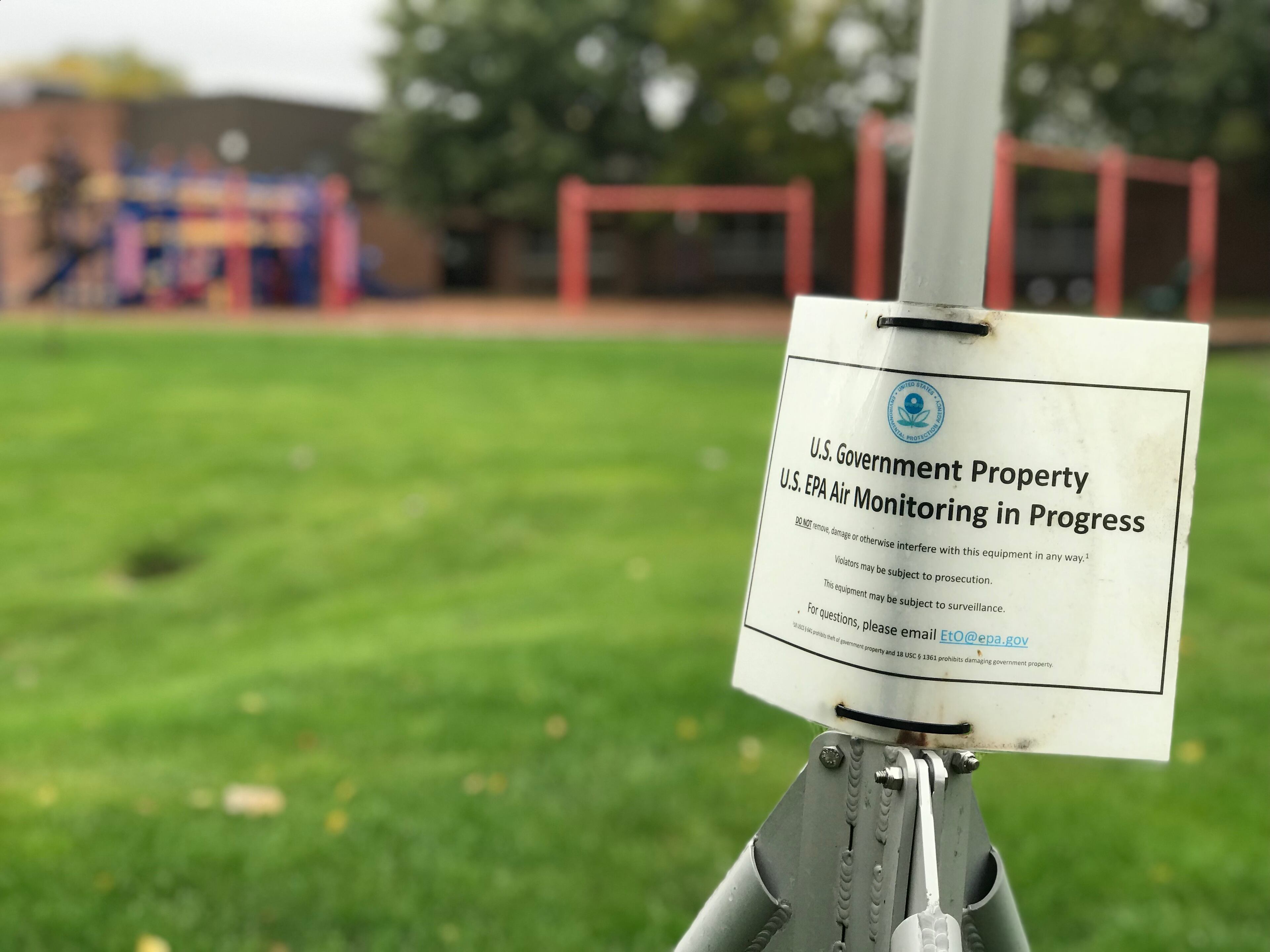Fulton ethylene oxide testing shows levels exceeding EPA threshold

Levels of a cancer-causing gas within a five-mile radius of a Fulton County sterilization plant are higher than federal regulators consider acceptable, according to test results delivered to the county commission Wednesday.
Commissioners asked questions about the results but did not ask for additional testing or require the company, Sterilization Services of Georgia near Fulton Industrial Boulevard, to take any action.
The county hired an outside consultant to conduct air tests for ethylene oxide at 13 locations over 10 days in October. Those locations included eight schools in Cobb, Douglas and Fulton counties. All testing locations were within a five-mile radius of the facility, which uses the gas to sterilize single-use medical devices.
Nearly all of the 125 samples exceeded the U.S. Environmental Protection Agency’s acceptable threshold, though data was not available for two samples. The EPA predicts exposure above its safe threshold can cause 100 additional cancer cases per 1 million people over a lifetime.
Concern over ethylene oxide led to town hall meetings and public protests in recent months, as residents have become aware of the potential danger of the gas.
BACKGROUND | Fulton County test air for ethylene oxide in Fulton industrial area
Dyron Hamlin, a representative of Arkansas-based air testing consultant GHD Services, acknowledged that a majority of the samples exceeded the EPA limit, but said they were below the standard considered safe by the industry — and below a standard set in a controversial Texas study that claims the gas is less dangerous than the federal government has determined.
“The levels that we measured in the Fulton County area are very low,” Hamlin said. “There’s no indication of a need for concern or further action.”
But Richard Peltier, an expert in air pollution exposure at the University of Massachusetts, Amherst, said the report that the contractor gave Fulton commissioners “obfuscates the results” by including benchmarks from industry lobbyists.
“This report just exudes industry funk. It’s meant to confuse people,” Peltier said.
Sterilization Services of Georgia declined to make anyone available for comment.
‘Simply unacceptable’
Most of commissioners’ questions revolved around how the air sample results compare to testing around two other sterilization facilities — Sterigenics in Cobb County and Becton Dickenson in Covington.
Both of those facilities have been subject to intense public protest, and both facilities have agreed to install millions of dollars in additional emission controls in response to pressure from Gov. Brian Kemp’s office. Sterilization Services of Georgia has also agreed to upgrade its emission controls.
Georgia Sen. Jen Jordan (D-Atlanta) has called for stronger regulations on ethylene oxide and stricter oversight of medical sterilizers. She said Fulton commissioners’ conclusion that the test results are acceptable is “incredibly troubling.”

Jordan was especially concerned about the high levels at schools. She said inaction was “simply unacceptable.”
“To disregard what are obvious dangerous levels doesn’t make much sense to me,” she said. “If [ethylene oxide] registers as detected, that’s a problem, period.”
Ethylene oxide came to Georgians' attention over the summer — more than three years after the EPA upgraded ethylene oxide's link to cancer. Lawmakers and residents were shocked by a July report by WebMD and Georgia Health News highlighting potential increased cancer risks at the Sterigenics and BD plants. The medical sterilizing companies are legally permitted to use and emit the carcinogenic chemical.
READ | For cancer survivors, Sterigenics raises haunting questions
Fulton leaders agreed in September to spend about $70,000 testing the air around Sterilization Services of Georgia.
The state Environmental Protection Division received the results the same day they were presented to the Fulton commission.
As for the Fulton County School District, spokesman Brian Noyes wrote in an email that the school district did not have the test results until they were sent by the AJC.
“Obviously, the health and safety of our staff, teachers, and students is paramount in all we do at Fulton County Schools,” Noyes said. “We’ll have our facilities folks look at this and work with the County.”
Five-mile radius
Kyle Steenland, a professor of environmental health at the Rollins School of Public Health at Emory University, said the ethylene oxide levels registered in Fulton are concerning. But he questioned why Fulton tested a five-mile radius around Sterilization Services of Georgia, saying the gas usually dissipates quickly.
Steenland also said because ambient air levels have just begun to be measured, and ethylene oxide can occur naturally, it’s unclear what a normally occurring amount of the gas might be.
Still, he said, the county testing “almost unanimously” exceeded the guidelines.

“I don’t think anyone really knows how concerned we should be about this,” he said. “If the high numbers are near the plant, I would worry about that.”
The state EPD recently renewed a permit allowing the company to operate under the condition that it installs improved filters by the end of the year.
A spokesman for the agency said the county’s findings would not have impacted the decision to renew the permit.
‘No further actions’
The AJC found that, until the recent interest, the state Environmental Protection Division has relied solely on the companies to report their emissions. Georgia has a history of being industry-friendly when it comes to environmental regulation. But under pressure from constituents, the state has recently taken a harder line.
State Rep. Erick Allen, D-Smyrna, said in November that he intends to introduce legislation next year that would increase state oversight of ethylene oxide. Fulton commissioners have indicated that they also want to push for improved air quality legislation.
READ | Sterigenics says it suspended operations after July 2018 explosion
But Robb Pitts, the chairman of the Fulton County commission, said he was in a “holding pattern” until more information shows ethylene oxide levels in the area are unsafe.
The county, though, will not seek more information.
“I’m not a scientist, and I have to accept the findings that were presented to us,” he said. “We received the report, we heard the report. There are no further actions contemplated in response to the report.”
Data Specialist Jennifer Peebles contributed to this story.
Like North Fulton County News Now on Facebook | Follow us on Twitter
THE STORY SO FAR
Fulton County conducted testing for the carcinogenic ethylene oxide gas over 10 days in October. The chemical, used to sterilize medical equipment and some food products, has been in the news in recent months after high levels of the gas have been detected near sterilization plants that use it, including in Georgia. The recent testing showed higher-than-acceptable levels near Sterilization Services of Georgia in the south part of Fulton County.




